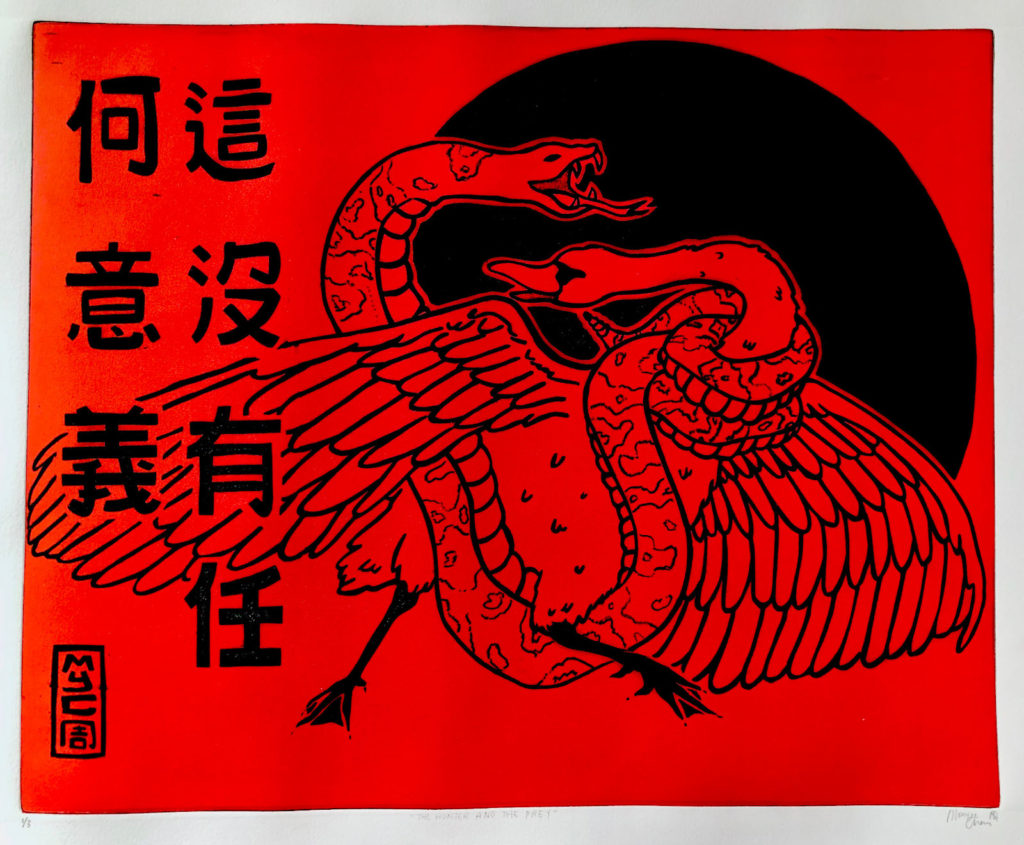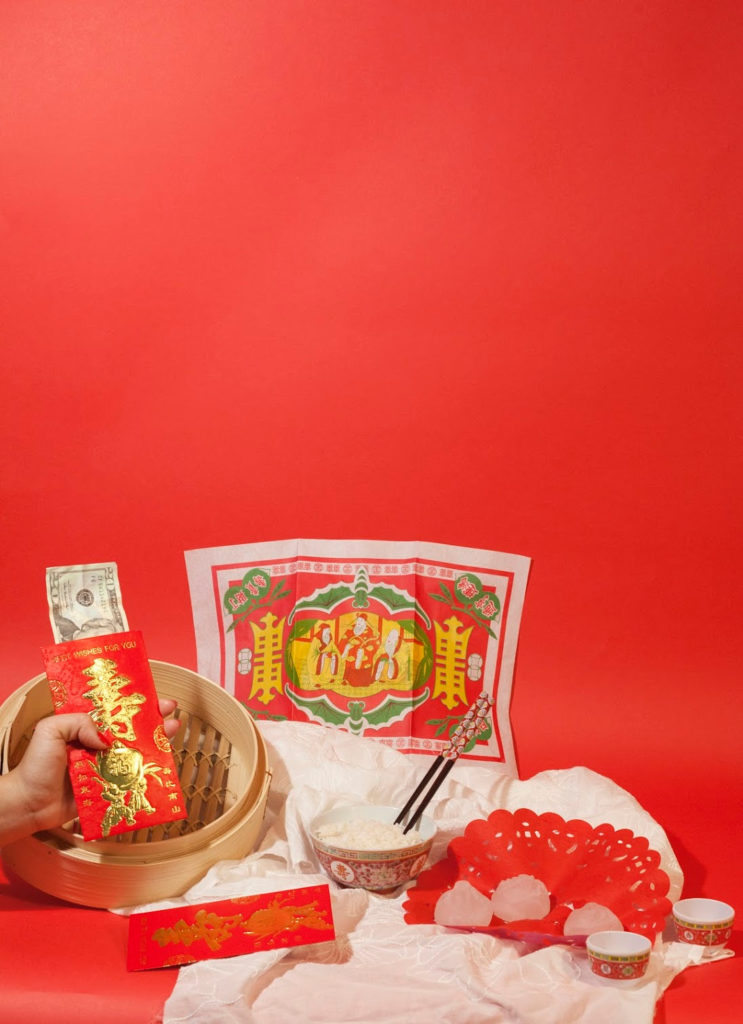Editor’s note: though poet Shankar Narayan and artist Monyee Chau come from different cultural backgrounds, their work addresses similar issues, including resisting cultural assimilation. They’ll both be participating in the event “Seattle Writers + Artists,” 6:30 pm, Tues. December 10 at Vermillion in Seattle’s Capitol Hill neighborhood.
.
Unbordered
there is the border
there the border remains
border between country and country
border between body and body
border between myself and those
i have violenced in the name of manhood
border between myself and my
vulnerability
within others’ borders
i search myself
between anger
and man
between spoken
and unspoken
all these abstractions
unfit for poetry
how i long to be genderless
beast in genderless world
where woman and man are synonyms
for each other and for perfection
if this poem followed form i’d turn now
to talk of breaking borders
but when have bodies
ever followed form
when have borders ever freed us
to choose our vessel
.
.
Christmas Tree
Because I’ve read the history books I’ve seen
this picture—find a beautiful thing and celebrate
by killing it. Bring it into your dominion
and watch it slowly die—that is the story
of my country, after all. I have never settled
though I love the hayride, Cascadia’s winter air so clean,
so different from the Delhi I left behind, my friend’s hair so golden
in the impossible sun, her children giggling, that I almost feel
what it means to be a part
of something. But to be colonized means never to recognize
belonging—so when you feel something
like it you question, wonder if that voice rasping outsider, outsider
really means it. And then the blade, the hacksaw
to the tree hunkered into the curve of the hillside, and when we choose
it we choose it for its perfection, though the voice resists, says No,
don’t be so beautiful, because it seems blameless
like the peasant so exquisite she draws the king’s
eye, and he points to her and says That one, and after his procession
with its stallions and imported elephants the guards come, drag
her from her hovel as she wails, but her father and mother do nothing
because helplessness has colonized
their bodies from deep inside, and now I too have failed
to speak up again. It is too late
for this little pine on this hopelessly gorgeous day in which I am losing
myself on this radiant hillside, radiant
as the queen in her marriage procession, freighted
in emeralds and conquest diamonds, perfect
even if she does not smile—and it’s possible, even if I do not remember,
that it is my own hands that seize
one half of the hacksaw, and it is my own back that bends to the grim
work of severance, of drawing in the teeth, jagging first through unresisting
bark, then deeper and deeper through xylem and phloem and into the deepest heart-
wood, and who knew that felling a single spindly tree
would be so difficult, but if nonetheless I put all my might into the killing
it is because my friend’s smile glitters on the other side
of the blade, I sap all my strength to do this, though I can see
the future so clearly, after the tinsel, the lights, the ornaments
hung one by one, each with a history,
after I am encircled in the glow of this family who love
me, then the icy curb where the pine lies
on its side, stripped of all adornment. And I will go back
to my cold living room which I have tried to warm with my own
small tree with tiny lights that shine when plugged in. It sends its burn
so deep inside me. It’s fake, though.
.
.

.
Kurta
For three weeks of each year I am
my other self, meaning my real
self, meaning I’m trying not to lose
track of how many skins I’ve shed. Doesn’t the body
know—no matter how you cloak,
some things feel home. Hence this thin
cloth, the length of one stride, this body
was born for—lean and long, centuries
of hunger and heat reflected like mirage
in its flow, no losing limbs
in Wal-Mart lumberjack flannels
as I have been lost for twenty-five years,
in this cloth I find myself spun, though
many who think they know me won’t recognize
the self I find. I am always arranging my body
as others want it. I have wandered
years in suits like snakeskins
though in my heart I am the mongoose, I have never knotted
a tie that wasn’t slowly choking
me, conscripting me into uniform the British
refused to relinquish when they colonized
our bodies. And what body can forget
erasure, erase empire? The churidar caresses
my leg, tight to skin like mother and lover, secretly defeating
hazy air of all the throne rooms I trudge
to find signs, visa or green card dropping from sky. Here
I wear more colors than a single iris can hold,
even if I cannot say why I wear mostly black
in my other, American life, black that is the absence
of color. Instead I make of my body and yours
something new, absorbing
like red dye the greatest joy of every stranger
who crosses into your land
and becomes you—in our brown
empire we grow together, and together
we are reborn. This is how we colonize—let there be
turquoise, vermillion, saffron,
lapis lazuli, iridescent dragonfly, changeless
diamond, satrangi. This rainbow
becomes you. Kurta, hold us
here. Here we turn all
colors. Here in your embrace
I will breathe.
.
.
Diasphoria
Never changed my name. Not to John, not
to Paul, not any other goddamn apostle. Never
understood. Why? Never
needed four horsemen. Never
grasped in graspy immigrant hand someone’s twisted
antiquity. Cognitive phonics, turbaned
Sikh in Birkenstocks, backpack with twang. Never changed
names. Never saw assimilation half-
cooked, half-consumed, half-cocked. Did she mind
wrapping her mouth around this name? Never
got Siddharth to Sid, prince of peace
to cat disease, never changed to Shaun no
matter how much shit. New country—one
syllable all the slot you get. Rohit lops off
an appendage, runs for Congress—all the polls
agree. So much in a name, check-
box familiar, comfort close at hand. My name lack
of human. Someone changed
it anyway, easier than trying,
people should know better. Seen me twenty years. Surrounded
by Andrew, internalize Judas. Years later know
what a name is. Years later Bobby and Nikki add color
to bloodless coup. Hear twang, feel
shame. Where’d you go,
Piyush and Namrata, ejected
from beauty contest neither black
nor white, checkmate, too late? Leave inconvenient
Hindu at churchhouse door. Some Catholics are Shivas,
some violence wraps flaming mouths
around my names. God of destruction—who
is here, who is there, who never left, I never
reclaimed. Didn’t need to. Diaspora
is dispersal to sixteen winds
is born name not one you want
is country when too many shed names
hide like tigerskins of creatures
you once were. Apocalypse
reflecting in eye glass. Never
stopped being beast.
.
.

Artwork by Monyee Chau, Lunar New Year photographs are a collaboration between Monyee Chau and Alexandria Britt.
Monyee Chau’s notes on the images:
My Family’s Apple Pie 2019
digital illustration
dimensions vary
If You Don’t Share The Dog’s Head With Your Children… 2017
found cardboard
5’ x 7’ x 2”
This is an old country Taiwanese saying my grandfather shared with me. I wanted to recreate it in a way that expresses the fragility and possible ephemeralness of stories. I wanted to play to racial stereotypes while showing that these things were put on our people for the sake of survival.
Gung Hei Fat Boi 2018
Collaboration with Alexandria Britt
photography
dimensions vary
This is a self portraiture series to queer this strange life of a new identity for Asian Americans influenced by their heritage and by westernized culture and questioning it through the culturally important day of the Lunar New Year.
Hunter And Prey 2019
vitreography on rives BFK
22.5” x 19”
In this piece I wanted to play with the audience’s expectations of what they have of my work and expect heavy symbolic meaning as a lot of Asiatic work does. Eastern imagery being shown with characters often sparks the inevitable, “Wow! What does it mean?” The translation says: “This has no meaning.”
Publication of these poems and art was made possible by a generous grant from the Seattle Office of Arts & Culture.

Shankar Narayan explores identity, power, mythology, and technology in a world where the body is flung across borders yet possesses unrivaled power to transcend them. Shankar is a four-time Pushcart Prize nominee, and is a recipient of fellowships and prizes from Kundiman, Jack Straw, Flyway, and Hugo House. He is a 4Culture grant recipient for Claiming Space, a project to lift the voices of writers of color, and his chapbook, Postcards From the New World, won the Paper Nautilus Debut Series chapbook prize. Shankar draws strength from his global upbringing and from his work as a civil rights attorney for the ACLU. In Seattle, he awakens to the wonders of Cascadia every day, but his heart yearns east to his other hometown, Delhi..
Monyee Chau is a Taiwanese/Cantonese American artist residing in Seattle. They received a BFA from Cornish College of the Arts, and explores the ideas of decolonization and ancestral healing through labor in multiple processes of art. She is passionate about redefining the experience of being a second generation immigrant in America, and building community through shared food and storytelling.
.
If you appreciate great writing and art like this, please consider becoming a supporting reader of Cascadia Magazine at our donate page. If you’re already a supporting reader, thank you!

One comment
Comments are closed.